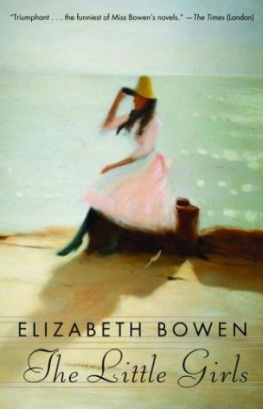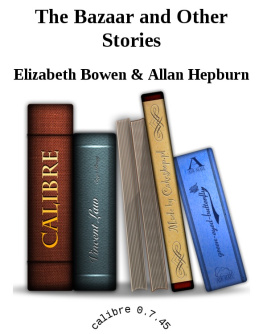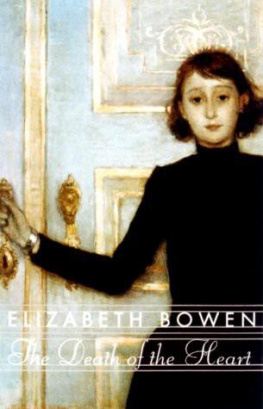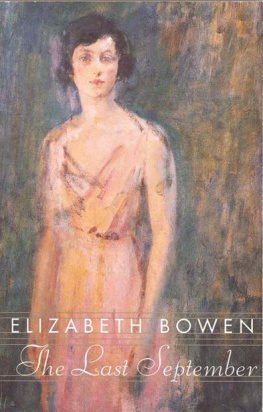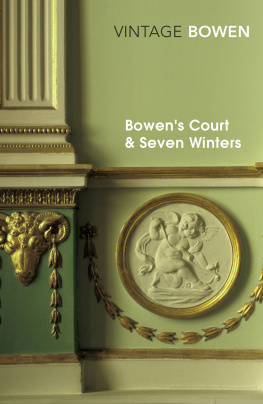Elizabeth Bowen - The Heat of the Day
Here you can read online Elizabeth Bowen - The Heat of the Day full text of the book (entire story) in english for free. Download pdf and epub, get meaning, cover and reviews about this ebook. year: 1948, genre: Humor. Description of the work, (preface) as well as reviews are available. Best literature library LitArk.com created for fans of good reading and offers a wide selection of genres:
Romance novel
Science fiction
Adventure
Detective
Science
History
Home and family
Prose
Art
Politics
Computer
Non-fiction
Religion
Business
Children
Humor
Choose a favorite category and find really read worthwhile books. Enjoy immersion in the world of imagination, feel the emotions of the characters or learn something new for yourself, make an fascinating discovery.
- Book:The Heat of the Day
- Author:
- Genre:
- Year:1948
- Rating:5 / 5
- Favourites:Add to favourites
- Your mark:
- 100
- 1
- 2
- 3
- 4
- 5
The Heat of the Day: summary, description and annotation
We offer to read an annotation, description, summary or preface (depends on what the author of the book "The Heat of the Day" wrote himself). If you haven't found the necessary information about the book — write in the comments, we will try to find it.
The Heat of the Day — read online for free the complete book (whole text) full work
Below is the text of the book, divided by pages. System saving the place of the last page read, allows you to conveniently read the book "The Heat of the Day" online for free, without having to search again every time where you left off. Put a bookmark, and you can go to the page where you finished reading at any time.
Font size:
Interval:
Bookmark:
Elizabeth Bowen The Heat of the Day
First published in 1948
To Charles Ritchie
Chapter 1
THAT Sunday, from six o'clock in the evening, it was a Viennese orchestra that played. The season was late for an outdoor concert; already leaves were drifting on to the grass stage--here and there one turned over, crepitating as though in the act of dying, and during the music some more fell. The open-air theatre, shelving below the level of the surrounding lawns, was walled by thickets and a few high trees; along the top ran a wattle fence with gates. Now the two gates stood open. The rows of chairs down the slope, facing the orchestra, still only filled up slowly. From here, from where it was being played at the base of this muffled hollow, the music could not travel far through the park--but hints of it that did escape were disturbing: from the mound, from the rose gardens, from the walks round the lakes, people were being slowly drawn to the theatre by the sensation that they were missing something. Many of them paused in the gateways doubtfully--all they had left behind was in sunshine, while this hollow which was the source of music was found to be also the source of dusk. War had made them idolise day and summer; night and autumn were enemies. And, at the start of the concert, this tarnished bosky theatre, in which no plays had been acted for some tirhe, held a feeling of sequestration, of emptiness the music had not had time to fill. It was not completely in shadow--here and there blades of sunset crossed it, firing branches through which they travelled, and lay along ranks of chairs and faces and hands. Gnats quivered; cigarette smoke dissolved. But the light was so low, so theatrical and so yellow that it was evident it would soon be gone. The incoming tide was evening. Glass-clear darkness, in which each leaf was defined, already formed in the thicket behind the orchestra and was the other element of the stage. The Sunday had been brilliant, without a stain of cloud. Now, the burning turquoise sky of the afternoon began to gain in transparency as it lost colour: from above the trees round the theatre there stole away not only colour but time. Music--the waltzes, the marches, the gay overtures--now began to command this hour-less place. The people lost their look of uncertainty. The heroic marches made them lift up their heads; recollections of opera moulded their faces into unconscious smiles, and during the waltzes women's eyes glittered with delicious tears about nothing. First note by note, drop by drop, then steadily, the music entered senses, nerves and fancies that had been parched. What first was a mirage strengthened into a universe, for the shabby Londoners and the exiled foreigners sitting in this worn glade in the middle of Regent's Park. This Sunday on which the sun set was the first Sunday of September 1942. Pairs of lovers, fatigued by their day alone with each other, were glad to enter this element not themselves: when their looks once more met, it was with refreshed love. Mothers tired by being mothers forgot their children as their children forgot them--one held her baby as though it had been a doll. Married couples who had sat down in apathetic closeness to one another could be seen to begin to draw a little apart, each recapturing some virginal inner dream. Such elderly people as had not been driven home by the disappearance of sun from the last chair fearlessly exposed their years to the dusk, in a lassitude they could have shown at no other time. These were the English. As for the foreigners, some were so intimate with the music that you could feel them anticipate every note; some sat with eyes closed; others, as though aroused by some unbearable movement inside the breast, glanced behind them or quickly up at the sky. Incredulity, as when waking up from a deep sleep, appeared once or twice in faces. But in most of them, as they continued to sit and listen, stoicism only intensified. A proportion of the listeners were solitary; and, of the solitary, those who came every Sunday, by habit, could be told from those who had come this Sunday by chance. Surprise at having stumbled upon the music was written on the faces of first-timers. For many, chiefly, the concert was the solution of where to be: one felt eased by this place where something was going on. To be sitting packed among other people was better than walking about alone. At the last moment, this crowned the day with meaning. For there had been moments, heightening towards the end, when the Sunday's beauty--for those with no ambition to cherish, no friend to turn to, no love to contemplate--drove its lack of meaning into the heart. There were those who had followed the others into the theatre automatically, and who asked nothing now they had sat down. You could observe one or two who remained locked in some unhearing obsession--for instance, an Englishman in civilian clothes who had placed himself towards the outside end of a row, halfway up the slope from the orchestra. On his left a Czech soldier, on his right a bareheaded woman wrapped in a coat, each spaced out from him by a vacant chair. This man's excessive stillness gave the effect not of abandon but of cryptic behaviour. He sat body bent forward, feet planted apart on the grass floor, elbows lodged on his knees, insistently thrusting the fist of his right hand against and into the open palm of his left. His hat was pulled forward over his eyes. The concentration with which he frowned at his hands showed the music to be no more than a running accompaniment to his fixed thought. Unmistakably he was waiting for something here: he would not change his position or go away until whatever it was had resolved itself. Sound, however, had become a necessary circumstance: having begun to think in it he could not think without it--whenever a number ended in a ripple of clapping he looked sharply up, with an air of outrage and dislocation, as though the lawn had shifted under his feet. He would turn his frown sharply on the conductor--who, facing round at the audience, bowing, let his baton slowly fall to rest at his side--as though to say: "What are you doing? Go _on__." Then, in the early minutes of every interval, he would cast about at his neighbours a baited look, as though blaming everyone else there. That recurrent look of his at first directly encountered no other eye. None the less it had begun to be noted, to be wondered at, then to be lain in wait for--it was at last to be trapped. His righthand neighbour opened her mouth abruptly. "That was number seven they've just played." He at once looked, distasteful, the other way. "Like to look at my programme?" "N'thanks," he said. Being accosted jerked him near enough to the surface to make him remember he had forgotten to smoke. He felt for his packet of cigarettes, lit one, let the match drop between his knees, then shifted one foot to stamp it out. All was done without looking her way again. In a voice quick with injury she continued: "All right, I just thought you might want to know." He replied by a pull on his cigarette and a prolonged gaze away past the Czech soldier. Behind the thicket, at the far end of the row, the last silent crackle of sunset was going on. "I was not just speaking to you--if that's what you thought." "Did I?" "Oh, you did!--now I'm sorry I spoke." "Right: then suppose we leave it at that." She watched him glance at his wrist watch, meanwhile feeling him calculate whether to move or not. But the orchestra, by coming to the alert, beginning to turn over their sheets of music, looked like beginning to play again--this hope of an end to further annoyance made him turn to look at the speaker, for the first time. He more than looked, he continued to look, he stared at this person, so disingenuous, of a so impassioning wish to be in the right. So strong had become his habit of mind that he saw no behaviour as being apart from motive, and any motive as worth examining twice. His and her eyes met with what was already familiarity; her pertinacity and his rudeness having created a sort of bond between them and brought them to the point of a small scene. He confronted a woman of about twenty-seven, with the roughened hair and still slightly upward expression of someone who has been lying flat on the grass. Her full, just not protuberant eyes looked pale in a face roughly burned by summer: into them the top light of the roofless theatre struck. Forehead, nose, cheekbones added no more than width. Her mouth was the only other feature not to dismiss; it was big; it was caked round the edges, the edges only, with what was left of lipstick, inside which clumsy falsified outline the lips turned outwards, exposed themselves--full, intimate, woundably thin-skinned, tenderly brown-pink as the underside of a new mushroom and, like the eyes once more, of a paleness in her sun-coarsened face. It was the lips which struck him and could have moved him, only that they did not. Halted and voluble, this could but be a mouth that blurted rather than spoke, a mouth incontinent and at the same time artless. She wore an imitation camelhair coat; the chill of dusk had made her turn up the collar and wrap the fullness over her crossed knees. One hand was lost in a pocket; the other, holding the programme by one of its corners across her lap, had a knocked knuckle; also from time to time the pads of the thumb and forefinger rasped on the yellow paper. Brown-and-white shoes, not bad, had been walked and worn out of shape; veins appeared in the naked arch of her foot, and the profuse softness of hair on her bare legs showed these to have been never pumiced or shaved. About her way of sitting, about as much of her body as her way of sitting could let be seen, there was a sort of clumsy not quite graceless pre-adolescent strength. The effect of her was, at the first glance, that of a predominating number of London girls of this summer when the idealisation of Russia was at its height--that of a flying try at the Soviet comrade type. Or at least, this seemed the effect she hoped to convey. But with her this had not been successful, or gone far enough--otherwise, why, in the look that met his, should the attempted frankness be so uncertain; and why should colour appear, uneasily burning, under the sunburn of her cheeks? Somewhere hardiness failed her. She had committed herself, by speaking, then by speaking again to him, to the being of something she never was: what crisis of egotism or loneliness had been reached by her in the musical fading light? Egotism could be the more likely; it had been her self not her sex that she had wished to assert. Their look at each other, across the chair between them, took a second or two. She, during it, faced a man of around thirty-eight-or-nine, in a grey suit, striped shirt, dark-blue tie and brown soft hat. His unconsciousness, which had been what had mainly drawn her, was now, like the frown with which he had sat through the music, gone; it was succeeded by a sort of narrow, somewhat routine alertness she did not like. His "interesting-ness"--had that been a lie of his profile's? No, not quite: now that she had him full-face a quite other curious trait appeared--one of his eyes either was or behaved as being just perceptibly higher than the other. This lag or inequality in his vision gave her the feeling of being looked at twice--being viewed then checked over again in the same moment. His forehead stayed in the hiding, his eyebrows deep in the shadow, of his pulled-down hat; his nose was bony; he wore a close-clipped little that-was-that moustache. The set of his lips--from between which he had with less than civil reluctance withdrawn the cigarette--bespoke the intention of adding nothing should he happen to have to speak again. This was a face with a gate behind it--a face that, in this photographic half-light, looked indoor and weathered at the same time; a face, if not without meaning, totally and forbiddingly without mood.... It could not be enough to say she was discountenanced; her eyes dropped, looking their last at those stained two of his fingers, holding the cigarette. "We haven't met before?" he finally said, with the air of having at any rate thought this over. "How do you mean, met?" "We don't, I mean, know each other?" "I don't know you," said she. "I don't even know who you are." "Then that settles that." (All the same, he seemed not quite certain.) "Why," she added, "_are__ you anyone special?" "Ha, ha, no. No, I'm sorry to say I'm not." "I do know one thing; I know I've never seen you about this park." "No, you wouldn't have." "You mean you don't ever come here? Of course, I should know you _now__. I don't ever forget a face: do you?" "I could," he said, after thought. "That must come from you thinking so hard, you hardly notice. All this band, and you hardly noticed a note?" "So, you thought I must want to know what the music was?" Lest this be too subtle, his tone was unkind enough to drive at least his will to unkindness home--it did: she withdrew from the pocket her other hand in order to, self-protectively, fold her arms. She could be felt to falter behind the barricade; and the programme, let go of by her as though incriminated, fluttered to the ground. She nudged her chin sideways into her turned-up collar, then could but complain: "You keep wanting to catch me out!" "You?" he threw back, with a nervy bitten-off yawn, one eye on the orchestra--what _was__ holding them up? "Because _I__ can't help what it sounds like; I speak the truth every time. Because I--" "--Oh, pipe down." He gave a jerk of the head. "They're off!" They were: having hung for just that instant more suspended the music now broke with a light crash. The audience let out a breath and settled into its attitudes on the chairs. Evening had gained on the theatre even in that mean-time; a more perceptible smell of it stole from under the thickets, rose from the trodden grass. Cigarettes would be soon to be seen to glow. On the stage, the musicians' grouped black seated bodies had fastened to them the faces and hands of ghosts. They were to continue to play till the clock in the distance struck--but for how long, how much longer, it was being wondered in the emptying ranks of chairs, would they be able to see their score? Louie Lewis--whose name, that evening, was to remain unasked--unfolded her arms to rewrap herself in her coat. She could not, she could never, leave it at that--accordingly, leaning over the empty place, she glumly said, _sotto voce__: "Going to think some more?" She had made that impossible. Had she not borne in on him, in her moron way, the absurdities to which thinking in public could expose one, the absurdity with which one exposed oneself? She had given him, the watcher, the enormity of the sense of having been watched. New, only he knew how new, to emotional thought, he now saw, at this first of his lapses, the whole of its danger--it made you _act__ the thinker. He could, now, do not better than travesty, repeat in order to judge exactly how much it showed, his originally unconscious trick of the hands; he recalled this trick in his father, not before in himself--but it must have been waiting for him. Yes,'he had had recourse to it, fallen to it, this evening out of some unprecedented need for emphasis in the body. Yes, he had been forced to it by the course of what in the strict sense had not _been__ thought at all. The futility of the heated inner speed, the alternate racing to nowhere and coming to dead stops, made him guy himself. Never yet had he not got _somewhere__. By casting about--but then hitherto this had always been done calmly--he had never yet not come on a policy which both satisfied him and in the end worked. There never had yet not been a way through, a way round or, in default of all else, a way out. But in this case he was thinking about a woman. She had asked him to go away and to stay away: that was the best he could do--she said, last time. What did she expect him to do? She expected him to do whatever he did do: she had no idea what he did, but surely he did do something?--why not get on with that? She had finished up with: "I'm sorry, but it just is that you don't attract me. Why should we go on wasting each other's time?... There's something about you, or isn't something about you. I don't know what." He was not, however, through. He was once again, this evening, on his way to her flat. He proposed, in fact, to be back with her as the clocks struck eight. Up his sleeve he had something--only, the question was in exactly what manner to bring it out? He had hoped, by sitting down at the concert, to have arrived at the answer before they met. It seemed to Louie that there was overmuch music at this concert. There was nothing for her but to drop back again into the stupor in which she had been sitting before her notice lit on the thinking man. The quality of the stupor was not much altered--content at having forced him to notice her, she did not look back over their conversation or ask herself what it had come to or where she stood. Unlike him, she did not look at things in the light of their getting or failing to get her somewhere; her object was to feel that she, Louie, _was__, and in the main she did not look back too willingly at what might have been said or done by her in pursuit of that. She had her misgivings; though always, she hoped, no cause for them. She had never had any censor inside herself, and now Tom her husband was gone--he was in the Army--she had no way of knowing if she were queer or not. Possibly she addressed herself to unknown people in the hope of perceiving what _they__ thought--she had perceived just enough queerness in this last man to make her fancy he might not be a good judge. She often was disconcerted, but never for long enough to have to ask herself why this happened. Left to herself, thrown back on herself in London, she looked about her in vain for someone to imitate; she was ready, nay, eager to attach herself to anyone who could seem to be following any one course with certainty. Tom, by this time, had been drafted abroad; more or less she understood him to be in India. In his letters home he expressed the hope that she was getting on well and being a good girl: to this she never had any notion how to reply, so did not. She maintained what had been their married home, a double first-floor room in one of those little houses in Chilcombe Street, and worked every day at the factory in another, not too far distant part of London. In order to continue to meet the rent at Chilcombe Street, she drew, with Tom's consent, on the sum of money which had come to her from her parents, both of whom had been killed by a bomb. She had been the only child of their late marriage; they had been people who, having done well with their little business, or shop, at Ashford, found themselves in a position to sell it and retire; accordingly, when Louie was ten years old, there had been a removal to Seale-on-Sea, where the family had already spent happy holidays. It was at Scale, in the little villa they had so much enjoyed, that the elderly couple had been wiped out during the Battle of Britain. Louie, having been married by Tom early in 1939, was then in London. The marriage had been a surprise to everyone, most of all herself--actually, the~goodness of her home and the solidity in every sense of her people had been reassuring: she had been a far from bad match--as for her as a wife, it only could be supposed that Tom, himself solid, a serious and progressing young electrician, had a soft spot for comics. They had happened to meet when he was at Scale on holiday--_how__ it should have arrived that she caught his fancy he had not explained to her, and she had never asked. Child of Kent, she had been to London only a few times on a day-ticket before Tom brought her there as a bride. She now, that is to say within these last years, never left London, having been left with no place to go to. She was lucky, she understood by reason, in being left with Chilcombe Street: few wives of men called up remained placed as they were before. But the idea of Chilcombe Street's being home, which at the best of times had resided in Tom only, had been taken away by him to India. For her part, as things were now, she was glad to get out of it every morning: she neglected the rooms--front and back, opening on one another through an arch across which Tom had fixed a curtain--the Turkey-patterned lino lost its gloss and she went out leaving the big bed slatternly; in revenge, perhaps, for its being so cold all night. Her returns from the factory every evening had in one or another manner to be survived--all the fine evenings of this summer there had been the solution of a walk in the park; when it rained, she either sat in a movie or else lay on her bed in a series of heavy dozes alongside the hollow left by Tom's body. In this state, drugged by the rainy dusk, she almost always returned with sensual closeness to seaside childhood; once more she felt her heels in the pudding-softness of the hot tarred esplanade or her bare arm up to the elbow in rain-wet tamarisk. She smelt the shingle and heard it being sucked by the sea. Louie had, with regard to time, an infant lack of stereoscopic vision; she saw then and now on the same plane; they were the same. To her everything seemed to be going on at once; so that she deferred, when she did, in a trouble of half-belief to either the calendar or the clock. At present, though bodily seated on a chair on a darkening slope listening to music, she was in effect again in the park rose garden, where she had been walking that afternoon. Great globular roses, today at the height of their second blooming, burned more as the sun descended, dazzling the lake. Lagging along the turf between the beds, Louie repeatedly stooped to touch petals, her raspy fingertips being every time entered by their smoothness. She above all desired to snap two or three of the roses from their stems--had she been alone she would have taken the risk, but she dared not because of her Air Force friend. She had found all men to be one way funny like Tom--no sooner were their lips unstuck from your own than they began again to utter morality. To divert his attention she had once, even, tried staring up alarmedly at the sky. "_Look__--that balloon there's come all untied!" But his glance had been too brief. "They don't," he said to her, tolerant. "Oh, they do!" He only resettled his guiding thumb more firmly inside her elbow. "My husband saw one do," she improvised. "He told me." "I shouldn't wonder he told you a lot of things." The sneer at Tom turned her scarlet--she veered away from roses, rebelliously stiffening her muscles inside the airman's hold. He and she returned to the slope of mound under the ilex where they had already been lying most of the afternoon: here once more she spread her coat out, and he, somewhat absently, set to tickling her behind the ear with a blade of grass. Round them the lawns were dotted with other couples imploring with their extended bodies the yellow last of the sun. To this spot, to which Tom had been so much attached, a sort of piety made her bring any other man: she had thus the sense of living their Sundays for him. She stared up into the tree. "Not ticklish?" said the airman, dissatisfied. "What, aren't I?" "You ought to know," he said, throwing the grass away. "Don't you know anything?" He heaved over on to his back, dropping one hand over his eyes; and she, having for the moment forgotten what he looked like, turned round to wonder what was under the hand. Something more began to invade his manner--he began: "Where was it you said you lived?" "Why, I never did say." "Still, you must live somewhere. You ought to have a nice place, a nice girl like you." "Oh, I have," she said with enthusiasm. "You have?" He shifted his hand and rolled round his head in order to look at her with increasing interest. "Still, lonely, all on your own." With resentment she thought of the un-picked roses: _so__, why ever should he? "I'm not," she promptly said. "I live with my auntie. She lives with me." "Look," said the reddening airman, "what's this all of a sudden about you having an auntie?" "An invalid," threw in Louie even more rapidly. "Poor thing. Never goes out." The airman looked at her harder. "Come on," he said, "we'll drop in and meet the old cup o' tea.--Well?" Louie, sitting up, removed a twig from her hair. "You have no right to speak of my aunt like that," she said. (Nor of Tom, either, she added in her own mind.) "You've never got an aunt any more than I have," said the airman, stern with sexual anger. "How was I to know," she replied, "you had never got an aunt?" "You make me sick," he said, getting up. "Starting off by saying you were lonely. Wasting my afternoon." He stood up, pulled at his tunic, slapped at his pockets, finally stooped to brush shreds of moss from his trousers. "You ought to be ashamed, with your husband fighting." "Oh dear," said Louie, disheartened, "whatever is the matter?" "Time," he said aloofly, "I was getting along." "Still, it's been nice," she ventured, lying there sadly, receiving the last blast of disparagement from his back-view as he marched away. However, that was that, and she was now more than even with him about the roses and his mocking of Tom. When she was not disobliging, and she was not always, everything still somehow ended in her being told off--with a resignation no sigh could express she reached out for a new blade of grass and experimentally tickled her own ear, but was still not ticklish. Saddest of all, she found herself without any real desire to return to the roses; she stayed where she was, on the suddenly hard, chill and unloving breast of the lawn till she saw people moving towards the concert, whereupon she got up and moved after them. There is a freedom about an outdoor concert: you come or go at will--there is easy passage between the rows of chairs and your step muted by the grass disturbs no one. However, either the punctiliousness of a stranger or the superstition that rules any movement to do with love made the thinker wait where he was for the coming interval. Nothing more now than suffering the music, he sat on tensely, eye fixed on his watch. The music ceased: he shot up, stood, looked round at the thinned-out clapping, then, in the hurry of flight, made his way out past the Czech soldier, along the row of chairs, up the middle gangway. So far, so good. He paused for less than a second to get his bearings at the theatre gate--whereupon, up came Louie, breathless from her run. "I've had enough, too," she said. She swung into step with him like an old companion. "Looks quite ghosty," she said of the reach of lawns. "That must be mist off from the lake." "Goodnight, then," he said prematurely--for fifty yards more they had to share the path. "I'm going back home," she volunteered, "now, I think." "Much the best thing you can do." "You mean, the evenings are drawing in?" They were--the weeping trees, one by one, shivered slenderly in a tide of ground-mist; away on the mound each ilex stained with a little night of its own the after-death shining of the day. Ahead stood, still open, Queen Mary's gate, high gilded plaque and garlands having not yet forgotten their all-day glittering in the sun. "Are you?" said Louie suddenly. "What?" he said with a start. "Going home? No, I've got a date--thanks." She took this with unconcern; if anything, she sent him a puzzled look as though wondering how such a thing could be. He quickened his step, she hers. Paths parted, _they__ did not--she continued manfully at his side. Riled to a point, he turned on her, saying harshly: "What I meant was, I'd _go__ home, if I were you. You know, you'll land up in trouble one of these days. Tacking on like this. There are funny people about." "You mean, _you__ might be funny, for all I know?" "Which _is__ your way?" he demanded, stopping dead in his tracks. "Which?--either," she said in a struck, preoccupied tone. They were by this time outside the lovely gate; they went legging it down the short serpentine road that, with trees, railings and air of a private avenue, runs downhill from the Inner into the Outer Circle. Ahead one had still an illusion of wooded distance, out of whose blue and bronzy ethereality rose the tops of Regency terraces--these, in their semi-ruin, just less pale than the sky. They were shells: the indifference of their black vacant windows fell on the scene, the movement, the park, the evening they overlooked but did not seem to behold. Inconceivably, London was behind them. This moment of walking to meet the houses seemed to have its place in no given hour of time--though across it, in contradiction, St. Marylebone clock began striking eight. During the first stroke Louie and her companion, apart, and on his side hostile in thought, experienced a fusion of the nerves. He stepped off the kerb, crossing the road obliquely; she followed. "I don't know _your__ name," she said. "No. Why should you?" She seemed nonplussed. "Oh, I don't know. I only thought..." "Well, I can't help that. That's eight o'clock." "Oh," cried Louie reproachfully, "your date!" The end of the road was definitive: she for the last time turned, looked, with her big lips parted, then was with startling completeness gone. He stood in a sort of after-math of suspicion, not yet sure she might not have picked his pocket, then walked the other way.
Next pageFont size:
Interval:
Bookmark:
Similar books «The Heat of the Day»
Look at similar books to The Heat of the Day. We have selected literature similar in name and meaning in the hope of providing readers with more options to find new, interesting, not yet read works.
Discussion, reviews of the book The Heat of the Day and just readers' own opinions. Leave your comments, write what you think about the work, its meaning or the main characters. Specify what exactly you liked and what you didn't like, and why you think so.


